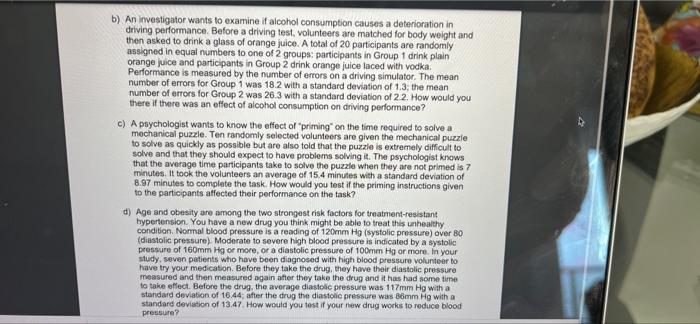b) An investigator wants to examine if alcohol consumption causes a deterioration in driving performance. Before a driving test, volunteers are matched for body weight and then asked to drink a glass of orange juice. A total of 20 participants are randomly assigned in equal numbers to one of 2 groups: participants in Group 1 drink plain orange juice and participants in Group 2 drink orange juice laced with vodka. Performance is measured by the number of errors on a driving simulator. The mean number of errors for Group 1 was 18.2 with a standard deviation of 13, the mean number of errors for Group 2 was 26.3 with a standard deviation of 2 2. How would you there if there was an effect of alcohol consumption on driving performance? c) A psychologist wants to know the effect of priming on the time required to solve a mechanical puzzle. Ten randomly selected volunteers are given the mechanical puzzle to solve as quickly as possible but are also told that the puzzle is extremely difficult to solve and that they should expect to have problem solving it. The psychologist knows that the average time participants take to solve the puzzle when they are not primed is 7 minutes. It took the volunteers an average of 15.4 minutes with a standard deviation of 8.97 minutes to complete the task. How would you test if the priming instructions given to the participants affected their performance on the task? d) Age and obesity are among the two strongest risk factors for treatment-resistant hypertension. You have a new drug you think might be able to treat this unhealthy condition Normal blood pressure is a reading of 120mm Hg (systolic pressure) over 80 (diastolic pressure) Moderate to severe high blood pressure is indicated by a systolla pressure of 160mm Hg or more, or a diastolic pressure of 100mm Hg or more in your study, seven patients who have been diagnosed with high blood pressure volunteer to have try your medication. Before they take the drug, they have their diastolic pressure measured and then measured again after they take the drug and it has had some time to take effect. Before the drug, the average diastolic pressure was 117mm Hg with a standard deviation of 16.44, after the drug the diastolic pressure was mm Hg with a standard deviation of 13.47. How would you fost if your new drug works to reduce blood pressure? b) An investigator wants to examine if alcohol consumption causes a deterioration in driving performance. Before a driving test, volunteers are matched for body weight and then asked to drink a glass of orange juice. A total of 20 participants are randomly assigned in equal numbers to one of 2 groups: participants in Group 1 drink plain orange juice and participants in Group 2 drink orange juice laced with vodka. Performance is measured by the number of errors on a driving simulator. The mean number of errors for Group 1 was 18.2 with a standard deviation of 13, the mean number of errors for Group 2 was 26.3 with a standard deviation of 2 2. How would you there if there was an effect of alcohol consumption on driving performance? c) A psychologist wants to know the effect of priming on the time required to solve a mechanical puzzle. Ten randomly selected volunteers are given the mechanical puzzle to solve as quickly as possible but are also told that the puzzle is extremely difficult to solve and that they should expect to have problem solving it. The psychologist knows that the average time participants take to solve the puzzle when they are not primed is 7 minutes. It took the volunteers an average of 15.4 minutes with a standard deviation of 8.97 minutes to complete the task. How would you test if the priming instructions given to the participants affected their performance on the task? d) Age and obesity are among the two strongest risk factors for treatment-resistant hypertension. You have a new drug you think might be able to treat this unhealthy condition Normal blood pressure is a reading of 120mm Hg (systolic pressure) over 80 (diastolic pressure) Moderate to severe high blood pressure is indicated by a systolla pressure of 160mm Hg or more, or a diastolic pressure of 100mm Hg or more in your study, seven patients who have been diagnosed with high blood pressure volunteer to have try your medication. Before they take the drug, they have their diastolic pressure measured and then measured again after they take the drug and it has had some time to take effect. Before the drug, the average diastolic pressure was 117mm Hg with a standard deviation of 16.44, after the drug the diastolic pressure was mm Hg with a standard deviation of 13.47. How would you fost if your new drug works to reduce blood pressure







